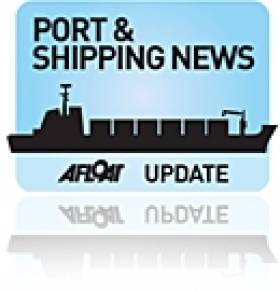Displaying items by tag: Multimodal
#MultimodalAward - UK based Peel Ports Group, owner and developer of the Liverpool2 container terminal, was recognised as logistics business of the year at the annual Multimodal event held in Birmingham.
The company that also operates the MTL Terminal in Dublin Port (see large containership caller), topped the Exhibitor of the Year category, which recognises business excellence, ahead of other highly commended transport and logistics entries from across the UK.
Now in its ninth year, Multimodal is the UK and Ireland’s premier freight transport, logistics and supply chain management event and is held in partnership with the Chartered Institute of Logistics and Transport and the FTA (Freight Transport Association).
The group, which also owns and operates Manchester’s Port Salford warehouse and distribution centre, was recognised by Multimodal judges for its progressive and innovative approach, as well as for its ambitious development plans across the North-west.
One of the UK’s largest port groups, Peel Ports is currently constructing its £300m landmark terminal expansion project, Liverpool2. (see delivery of giant container gantry cranes). The first phase of the new terminal will be fully operational in the autumn.
Once complete, Liverpool2 will create a state-of-the-art freight gateway as the UK’s most centrally-located, deep-water container terminal and will offer import and export companies located in the North-west of the UK ‘ship-to-door’ solutions via sustainable transport routes such as the Manchester Ship Canal.
David Huck, Port Director at Peel Ports, said: “To be recognised as the Exhibitor of the Year at this year’s Multimodal caps off what has been great 12 month period for the company. With the imminent opening of Liverpool2 and Port Salford we are very much looking forward to the year ahead.
"These annual awards allow the industry to gather and discuss what’s happening in logistics and what the next stages of multimodality are in the pipeline across the UK. It is a great honour to be recognised by our peers as delivering an exceptional business model driving interconnectivity across the country.”
Abbie McGuffie, Multiuser Warehouse Contracts Executive, at Peel Ports was also highly commended in the Young Logistics Professional of the Year category which recognises people under 32 in the industry with a proven track record.
Liverpool2’s waterway connections to Port Salford, as a port centric logistics hub, will also position Liverpool2 as the UK's first "green logistics hub" with the potential to further reduce transportation costs, congestion and carbon footprint for businesses importing and exporting to and from the North West of England.
New Italy-Ireland Part-Load Services
#Port&Shipping – Samskip Multimodal, have announced a new part-load services (LCL/groupage) between Italy and Ireland offering an alternative to traditional road haulage part load services.
The new service is in addition to Samskip's existing full container loads.
Samskip will operate two weekly departures, combining the Milano-Rotterdam rail service and two weekly Rotterdam-Dublin sailings served on Tuesdays and Fridays. This will enable Samskip to provide fast deliveries for a competitive price while saving on CO2 emissions.
The new service's distribution network in Italy, brings an efficient shortsea service. This coupled with the Dublin-based distribution centre, is able to deliver cargo within one day of the capital's area and within 48 hours to the rest of Ireland after the arrival of the vessel.






























































